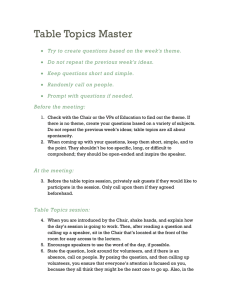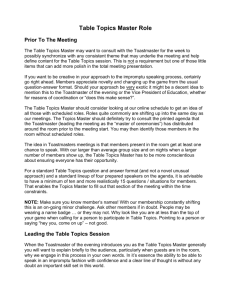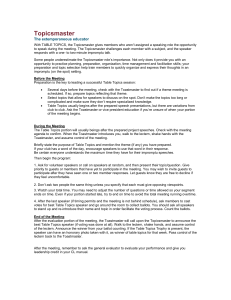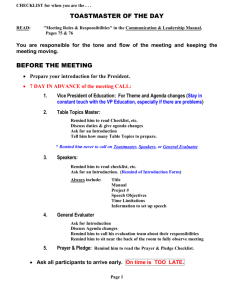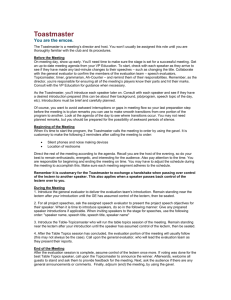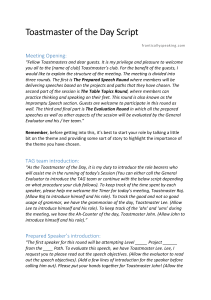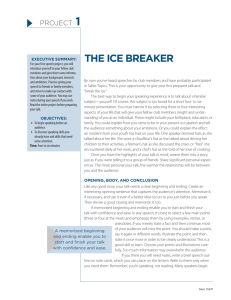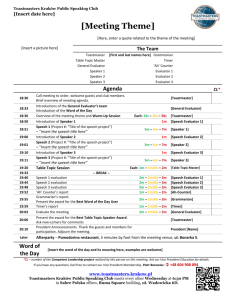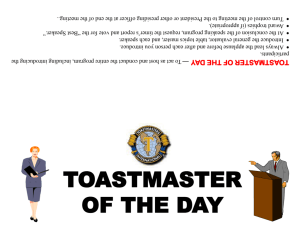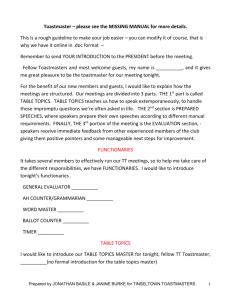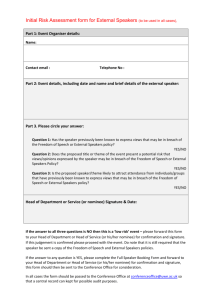Toastmasters Meeting Roles & Responsibilities Guide
advertisement
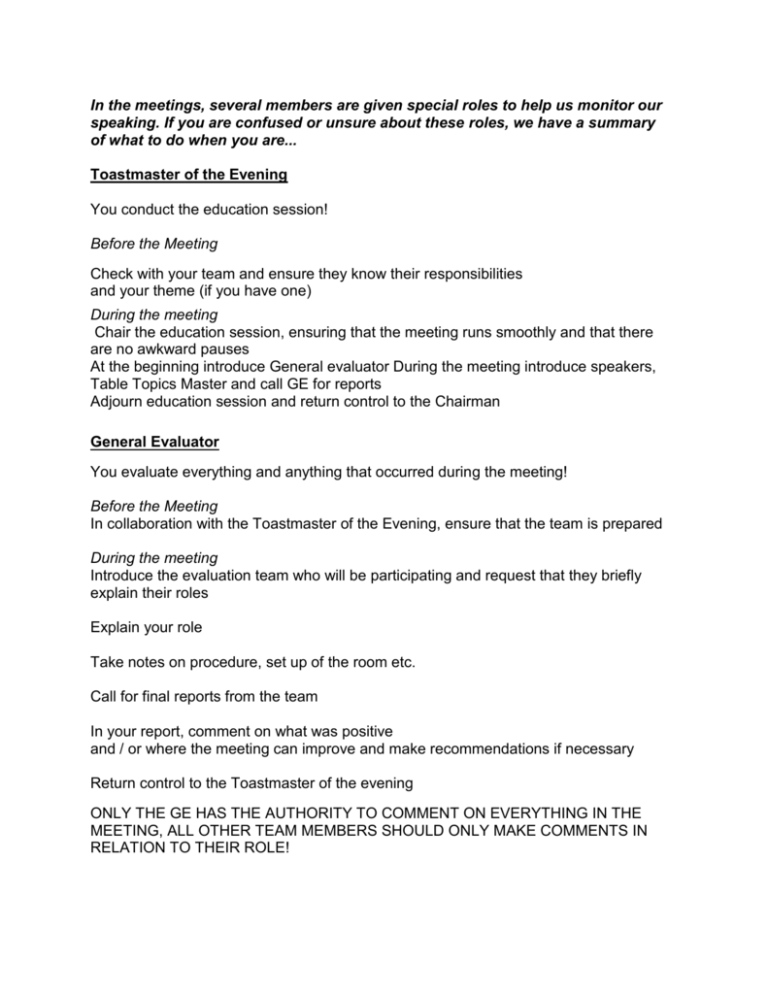
In the meetings, several members are given special roles to help us monitor our speaking. If you are confused or unsure about these roles, we have a summary of what to do when you are... Toastmaster of the Evening You conduct the education session! Before the Meeting Check with your team and ensure they know their responsibilities and your theme (if you have one) During the meeting Chair the education session, ensuring that the meeting runs smoothly and that there are no awkward pauses At the beginning introduce General evaluator During the meeting introduce speakers, Table Topics Master and call GE for reports Adjourn education session and return control to the Chairman General Evaluator You evaluate everything and anything that occurred during the meeting! Before the Meeting In collaboration with the Toastmaster of the Evening, ensure that the team is prepared During the meeting Introduce the evaluation team who will be participating and request that they briefly explain their roles Explain your role Take notes on procedure, set up of the room etc. Call for final reports from the team In your report, comment on what was positive and / or where the meeting can improve and make recommendations if necessary Return control to the Toastmaster of the evening ONLY THE GE HAS THE AUTHORITY TO COMMENT ON EVERYTHING IN THE MEETING, ALL OTHER TEAM MEMBERS SHOULD ONLY MAKE COMMENTS IN RELATION TO THEIR ROLE! Table Topics Master You prepare and issue the table topics for the meeting! Before the Meeting Check with the Toastmaster of the Evening if there is a theme and also if there are speakers for the evening Prepare between 4-5 questions / statements for the meeting, if there are no speakers you may include additional questions During the meeting When called by the Toastmaster of the evening, you chair the Table Topics session Give the judging criteria and then issue the topics At the end of the sessionremind the audience of the judging criteria, confirm if all the speakers met the timing criteria and collect evaluation slips Report to the GE of the winner of the Table Topicsand any other honourable mentions YOUR TOPICS SHOULD BE CLEAR AND SHORT. CALL FIRST ON PERSONS WITHOUT A ROLE. IF TIME ALLOWS AND THERE WERE LESS THAN 5 PARTICIPANTS, YOU MAY CALL ON A MEMBER WITH A ROLE. Speaker You present a speech or presentation! Before the meeting Check with your evaluator to ensure that the objectives and evaluation criteria are clear to you. Prepare a brief introduction of yourself for the Toastmaster of the Evening Give your Speech Manual to the Evaluator(s) Check that all equipment etc. is in place During the meeting Take deep breaths and relax! Try to give a great presentation! After the meeting Check with your evaluator (and mentor) on your performance Evaluator Evaluate the speaker’s presentation! Before the Meeting Ensure you know the objectives and the criteria for evaluating the speech Check with the speaker to ensure that he/she is familiar with said objectives and if there are any other areas they wish to be evaluated on During the Meeting Explain your role when introduced by the GE Record your thoughts on the speech highlight both positive aspects and areas where the speaker may need to improve on. Ensure that you have the speaker’s time from the Timer Give your report when asked by the GE Just mention a few points, after the meeting go into more details with the speaker Make sure you sign the speaker’s manual include the date and title of the speech IF A SPEECH DID NOT MEET THE REQUIREMENTS THEN YOU CAN RECOMMEND THAT THE SPEAKER PRESENT IT AGAIN. Timer You time the entire meeting! Before the Meeting Collect all the timer equipment and make sure you are familiar with it. Ask someone to time you when you have to speak if necessary During the meeting Note the times for all presentations Introduce your role briefly when called upon Ensure that the evaluators are given the times for the speeches before they give their report Give your report when called on by the GE. Grammarian You prepare a “Word of the Day” and monitor the use/ misuse of language during the meeting! Before the meeting Check if there is a theme Prepare the word of the day During the Meeting Introduce your role and the Word of the Day when called upon (give parts of speech, examples) Keep check of the persons who use the word correctly and incorrectly Monitor the grammar and misuse of the language Give your report when requested by the GE Pass the evaluation to the Sergeant at Arms to fine those who misuse the word. Ah/ Um Counter You note all “pause fillers” and “crutch” words used during the meeting! You also can note any improper procedures that were used during the meeting. During the Meeting Explain your role briefly when called at the beginning of the education session Note all fillers and pauses and give this report when requested by the GE Pass this information to the Sergeant At Arms for fines at the end of the meeting. Wit & Wisdom You will impart a little wit or wisdom to the audience! Before the meeting Check if there is a theme During the Meeting Present your piece when called on and ensure that it is reasonably short. Communication and Leadership Program Manual (1) The Ice Breaker (to introduce yourself to the Club and begin speaking before an audience) (2) Speak With Sincerity (to convince an audience of your sincerity and conviction on a subject you thoroughly understand) (3) Organize Your Speech (to organize a talk that includes a beginning, body and conclusion with a clearly defined goal) (4) Show What You Mean (to use body movements, gestures, facial expressions and eye contact to illustrate and enhance your talk) (5) Vocal Variety (to explore the use of voice volume, pitch, rate and quality as assets to your speaking) (6) Work With Words (to use words that effectively communicate your message to the audience) (7) Apply Your Skills (to apply all the skills learned in previous projects) (8) Add Impact To Your Speech (to learn how to use props effectively in your presentations) (9) Persuade With Power (to persuade the audience to accept your proposal or viewpoint) (10) Inspire An Audience (to express the feelings of the audience and inspire them using all the techniques learned so far)

